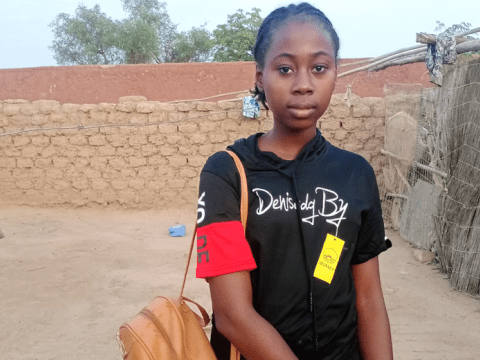Aminata can now only focus on her studies.

In Mali, children's rights are a stated political priority, where half of the population is under 18 years old. Thus, the constitution adopted in 1992 proclaims in its preamble the determination of the Malian people "to defend the rights of women and children.”
Unfortunately, in a country that has been facing a multidimensional crisis since 2012 and is now in a fragile context, millions of children have been affected by the conflict, making them more vulnerable to the protection of their rights and exposed to dangerous work, dropping out of school, and other forms of violence.
As in any other context of crisis or fragility, educating children and their parents about the protection of children's rights becomes a vital support for humanitarian organizations like World Vision.
Thus, thanks to funding from the European Union (EU Netherlands) and in partnership with the NGO Stop Sahel, a child rights protection project called (PESEDEM) has been implemented in the Mopti and Bandiagara regions by World Vision Mali. These regions of Mali are all affected by the conflict.
Aminata, was one of the direct beneficiaries of this child rights protection project, as she testifies to us in her own words. " My name is Aminata Diallo, 14 years old, I am in 9th grade from the commune of Sio. Before, I used to do small businesses like selling roasted peanuts and bananas."
"School was not at all important to me. I would skip school to go sell. My parents encouraged me to do small business. They also said I shouldn't stay in school, I belong at home." She continues,
"Right now, despite I went to 9th grade. I didn't like school very much. One day, my uncle came to visit us in the village. He once saw me selling roasted peanuts. He was very disappointed. Then, he asked me about my studies.” Aminata testifies
“He wanted to know if I knew about children's rights. I told him that I didn't! He told me that education was a right and that I should stop skipping classes. He told me that if you want to destroy a nation, you weaken its education system. But neither my parents nor I were totally convinced by him." Aminata confided in us.
Today, far from what her uncle told her, this 14-year-old girl is happy to have benefited from the PESEDEM project's awareness sessions that allowed her to learn about her rights and to stop skipping school.
"In addition to what my uncle told me, classmates who receive training on children's rights from World Vision have made me aware of children's rights. Through them; I learned that there are 4 basic principles of children's rights which are: the principle of non-discrimination, the principle of the best interest of the child, the principle of the right to life, survival and development and the principle of the child's opinion."
Today, Aminata’s parents have also been sensitized on child protection and children's rights. This allows them to protect their daughter.
"I couldn’t really imagine that someone would be able to convince my parents to let me stop doing my small business. Am happy for myself because I only now focus on my studies. My parents take care of me so that I can study. After my studies, I want to be a doctor.”
"I am very grateful to the PESEDEM project for its commitment to children." She concludes.